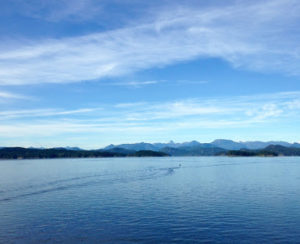Like most, I have always associated travel with positive things. It cultivates open mindedness, cultural awareness, and respect for diversity. Now, I’m not writing to discredit these benefits of travel, but rather to inform any reader who stumbles upon this article that travel is (in addition to being an eye-opening experience) a parasite on our planet.
In fact, a recent study published in Nature Climate Change revealed that tourism is the culprit for 8% of the world’s greenhouse gas emissions, which certainly puts into perspective our hunt for the most stunning landscapes and the world’s greatest cultural sites. So maybe travel isn’t the virtuous hobby that society has made it out to be. But this should not stop people from fulfilling their desire to travel the globe.
Here are a couple suggestions to help you reduce the environmental impact of your next trip:
- Take the Train (or Bus, Bike, Drive) Instead of an Airplane
This seems like a given, but choosing pretty much any mode of transportation over air travel will make the greatest difference in your carbon footprint while travelling. For example, taking the train from Paris to London instead of flying the same distance cuts your carbon emissions by 90%. On top of the obvious advantages, such as lower prices and more leg space, switching to trains isn’t only a good replacement for airplanes. When you arrive at your destination, walking, biking, or public transportation instead of driving is a good way to cut carbon emissions.
Of course, sometimes air travel is inevitable because the distance is too great. I come from Canada, where travelling by plane is sometimes necessary unless one is willing to drive for days on end.

- Try (Transparent) Carbon Offsetting
For those who are unfamiliar with this trendy buzzword, carbon offsetting entails calculating the amount of carbon your travels will produce and then donating an equivalent sum of money to essentially neutralize any carbon emissions. Atmosfair allows you to calculate your carbon emissions, and programmes such as Carbon Clear, The World Land Trust, and Cool Earth are engaged in carbon offsetting initiatives, through planting trees or improving infrastructure for instance. Furthermore, airlines such as Delta and United enable flyers to neutralize their carbon footprint.
A note of caution before you climb aboard your next carbon-offset flight: theoretically, carbon offsetting sounds like the perfect solution to travelling in an eco-friendly fashion, but it isn’t necessarily so in practice. Offsetting is seldom as effective as it is advertised to be – a 2016 EU study showed that 85% of existing offsetting programmes didn’t work. Carbon offsetting does not actually reduce emissions and must not be viewed as a solution to this problem.
But carbon offsetting is better than nothing. Before you consider offsetting the carbon emissions of your next trip, do your research and choose an organization that uses your money in a transparent and effective manner.

- Choose local
Once you’ve reached your destination, consider eating locally. Not only does local food not have to be transported over long distances (which imply carbon emissions), local food is generally less processed and better for your health as a result.

- Reduce your plastic waste
Plan before you leave for your trip to avoid buying (and throwing out) plastic when travelling, especially when the places you are planning to visit have little recycling infrastructure. For instance, take a reusable water bottle with you and a reusable bag for shopping and other needs. In addition, many companies including BRITA and Life Straw sell bottles that filter water, which can come in handy when the water quality is poor.
Sometimes, being environmentally friendly feels more like a luxury than a necessity what with organic and local food products, electric cars, carbon offsetting, and sustainable items costing more than their non-environmentally friendly counterparts. My aim here is not only to raise awareness about impact travel has on the environment, but also to show that traveling and being eco-friendly don’t have to be mutually exclusive.
Lorraine is a first year student in euram, originally from Vancouver, Canada, but with a French background. An avid traveller, Lorraine has travelled through most of North America, Europe, and the Middle East, but she has a soft spot for the West Coast (the best coast). In her free time, Lorraine enjoys skiing, catching up with friends over coffee, and reading.
All pictures by Lorraine Fabre @The Sundial Press.
Other posts that may interest you:
Discover more from The Sundial Press
Subscribe to get the latest posts sent to your email.





